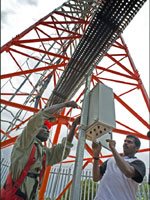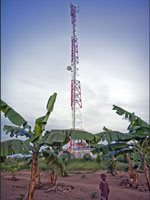The Global Humanitarian Forum and its president, former UN Secretary General Kofi Annan, together with Ericsson, the World Meteorological Organisation (WMO), mobile telecommunications company Zain, and the Earth Institute at Columbia University, yesterday, 18 June 2009, announced a major initiative, dubbed "Weather Info for All". Its aim is to improve Africa's weather monitoring network.
A recent Global Humanitarian Forum report estimated that climate change is responsible for some 300,000 deaths each year and over US$100 billion worth of economic losses, mainly because of shocks to health and agricultural productivity. Sub-Saharan Africa accounts for close to a quarter of these losses, and is the region at the most immediate risk of droughts and floods. Agricultural yields in some areas are expected to fall by 50% as early as 2020.
The Global Humanitarian Forum initiated this collaboration in response to Africa's gap in weather information highlighted at the forum's first annual event. The members of the initiative will deploy up to 5,000 new automatic weather observation stations across Africa, intending to provide a massive increase in crucial information to predict and manage climate shocks.
Africa has a network eight times below the WMO minimum recommended standard, and less than 200 weather stations that meet WMO observation requirements, compared to several thousand each in Europe, North America, and parts of Asia. The 5,000 weather stations will be installed at new and existing mobile network sites throughout the continent over coming years.
The public-private initiative will rely on the core business of telecom. Ericsson, a telecommunications equipment and services provider, plans to tap relationships with African operators such as Zain, who will host the weather equipment at mobile network sites being rolled out across Africa. Achieving the 5,000 target requires additional operator commitment and external financing.
The launch was held at the Global Platform for Disaster Risk Reduction, where Kofi Annan said: "The world's poorest are also the world's most vulnerable when it comes to the impact of climate change, and the least equipped to deal with its consequences. Today you find cell phone towers in almost every part of Africa. We have never been able to establish weather monitoring on that scale, until now. By bringing together the expertise and resources of different public and private actors, this project may help to save lives and improve the livelihoods of communities in Africa living on the frontlines of climate change."
Also present at the launch, Carl-Henric Svanberg, President and CEO of Ericsson, said: "...This initiative presents a unique opportunity to simultaneously help mitigate the impact of climate change for those most affected and to strengthen weather networks and systems across the continent. We look forward to having more operators come on board to realise the full impact of the initiative."
Mobile networks provide the necessary connectivity, power and security to sustain the weather equipment. Through its Mobile Innovation Center in Africa, Ericsson plans to develop mobile applications to help communicate weather information developed by national meteorological and hydrological services (NMHSs) via mobile phones. Mobile operators will maintain the automatic weather stations and assist in the transmission of the data to national met services.
The initial deployment, already begun in Zain networks, focuses on the area around Lake Victoria in Kenya, Tanzania and Uganda. The first 19 stations installed will double the weather monitoring capacity of the Lake region.
Zain CEO Saad Al Barrak commented: "It is truly wonderful that many communities across Africa will now have accurate meteorological information readily available. Here we can see how mobile communications can play a key role in helping to improve both the quality of life and safety for people in the remotest parts of the world."
Approximately 70% of Africans rely on farming for their livelihood, or close to 700 million people, and over 95% of Africa's agriculture depends on rainfall. Changing weather patterns due to climate change render obsolete traditional knowledge relating to agriculture otherwise reliable for centuries, creating a great need for meteorological information.
Also present at the Geneva launch was Michel Jarraud, Secretary-General of the WMO, the United Nations System's authoritative voice on Weather, Climate and Water, which is co-ordinating involvement of NMHSs participating in the initiative.
Jarraud said: "For food production, almost every decision is linked to weather, climate and water parameters. We see the Weather Info for All initiative as a major pan-African effort to empower our 188 members to provide enhanced weather information and services. Working through NMHSs, WMO will identify weather information needs, advise on technical requirements and help disseminate the information. This initiative may prove to be one of the most important for African meteorology in decades. The project will also therefore support the goals of the WMO-organised World Climate Conference-3, to be held from 31 August to 4 September 2009 in Geneva."
The initiative will have an impact far beyond agriculture and disaster preparation as it also includes assistance to national meteorological services in training and technical capacities. Better weather information will also make possible the development of services, such as microinsurance, which can be based on weather data indexes, such as rainfall. The initiative will also increase the volume of information useful for scientists, as well as for the water, transport and energy industries.
While the weather information gap is particularly acute in Africa, the initiative would be open to later expansion into other affected regions.
A further partner in the initiative is Columbia University's Earth Institute, headed by Jeffrey Sachs. To help with distribution to some of the most vulnerable and poorest parts of Africa and in partnership with the Earth Institute, automatic weather stations will also be installed in Millennium Villages - rural development projects spread throughout 10 countries and focused on achieving the Millennium Development Goals. By leveraging the expertise of Earth Institute scientists on climatology, agriculture, and health, the project hopes to identify key areas where there can be an immediate impact contributing a sizable knowledge bank to the effort.
"The Earth Institute is a proud partner in this highly innovative program," said Jeffrey Sachs, director of the institute. "Once the switch is turned on, a flow of extensive weather data will become available throughout Africa, with benefits extending from the national policymakers to the smallholder farmers. The Millennium Villages is a perfect launch site for the practical and timely application of weather data to bolster resilience and sustainable development in sub-Saharan Africa."

























